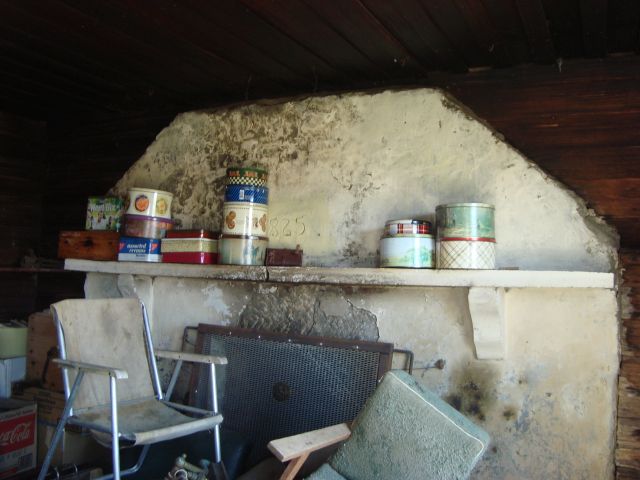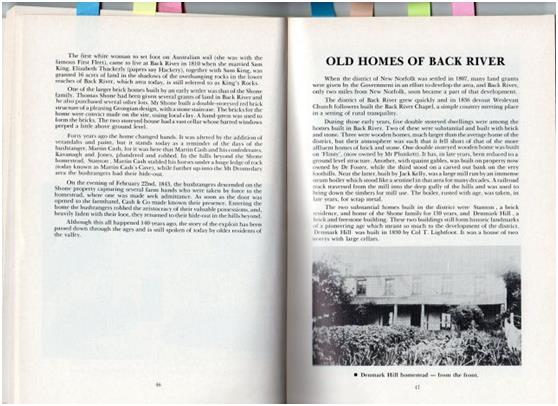
In October 1815, Mr Robert Knopwood noted in his diary - "JILLETTS HOUSE AT NEW NORFOLK ROBBED BY BUSHRANGERS WHO STAYED ALL NIGHT
From the above it would seem that he had also taken up land at Back River near New Norfolk, probably on lease at this stage. Even though he was on land at Newtown, and it had been measured as 160 acres, it is believed that the Grant was not received
He made a claim this year for stores supplied to the Hobart Commissariat Department, 1816.
On August 3rd 1816, there was a notice in the Hobart Town Gazette warning people not to take up notes drawn on Robert Jillett of New Norfolk. (It was quite legal, he had made them out to John Massey, a settler at New Norfolk and they had been lost) There were 4 notes - three for £50 pounds each and one for £28/6s a total of £178.6s. (A lot of money in 1816!)
Thomas Jillett (third child to be born after the marriage) was born on 23rd September 1817, and he was baptised at St. David's on 23rd October, 1817. He was born at New Norfolk. link to Thomas Jillett
Robert then put in an account to the Commissariat Department for payment of supplies given to parties out in search of the bushrangers at New Norfolk.
In 1817 he tendered to supply 1500lb of meat to the Government Stores by 28th February 1817.
A notice in the Hobart Town Gazette, 6th Dec, 1817 and 13th December, 1817 Re: Friendly Farms, Prince of Wales Bay, Newtown, formerly Robert Jillett's Martha Hayes, William Littlefield and Martin Hunt's farm - any cattle and sheep found on them will be impounded! Signed Thomas Wells and Adam Brodribb.
Perhaps Robert decided to leave his animals on the block for extra feed, for no cost to him!
In 1818 and probably earlier, Robert Jillett must have had a grazing licence to September 29th 1819, for a run between Macquarie Springs and Meehan's Valley York Plains.
Tasmanian Land Grants records of 1819 - 1821 indicate that Robert Jillett was granted 140 acres between New Town Rivulet
The boys each received 60 acres in Methuen at Back River. The land was granted to them as Freemen. This was also in 1823.
The deeds of Robert Jillett, and William and James Bradshaw are different because their's stated "Freemen" and his "Emancipated convict".
The three grants were all signed by Thomas Brisbane, Governor of New South Wales at that time.
From the Official Records of 1827 - Robert Jillett had a house in Collins Street, but when the Government wanted to realign the streets etc, and build a new market place Jillett's House had to go. He then decided to have two extra rooms added. The Government told him he had to pay for these himself. The late rains held up work among other things. He was offered a new house in Campbell Street as compensation. Then Robert asked why he hadn't finished the inside, he said he could not afford to and asked the Government to do it for him implying it was in the contract. This fell through so he asked for £400 and a lot of ground as compensation. Then for 500 acres at Green Water Ponds.
From the Alfred Stephens minute 143 of June 1827, from the Colonial Secretary "...inform the engineer that i have considered his recommendation, containing the proposition respecting Mrs Jillett's house, that in place of the house being completed in Campbell Street she should receive 500 acres at Green Water Ponds, free of the restriction of cultivations only.
The archives office do not hold the grant on micro-film, however it was to be rented at 2d per acre.
On 27th July 1927, an article in the Hobart Town Gazette indicates that Elizabeth Jillett was fined for selling Sly Grog at Green Ponds! (now Kempton) Humphrey's Rivulet.
John Jillett (fourth child after the marriage) was born 28th October, 1819 and baptised 19th November, 1819.
In 1820 A Market Place was opened on part of the land which included Jillett's house in Collins Street, the market opened on January 1st 1820, as indicated in Robert Knopwood's diary.
The grazing licence was again renewed for 12 months from September 1820 to September 1821. He was still supplying meat to the government. When he took out the lease he would have had to get permission for a lease, then go and find a suitable place to run his cattle and/or sheep. After that he would have had to come back to Hobart Town and register the lease and then take his stock to the property. When he first took out the lease the only complete surveying which had been done was around towns. Oatlands had not
In 1825 he had land holdings outside Oatlands, and built a dwelling on the land, where his sons raised sheep. That dwelling is a storage shed today. They then owned land in Back River (New Norfolk).



